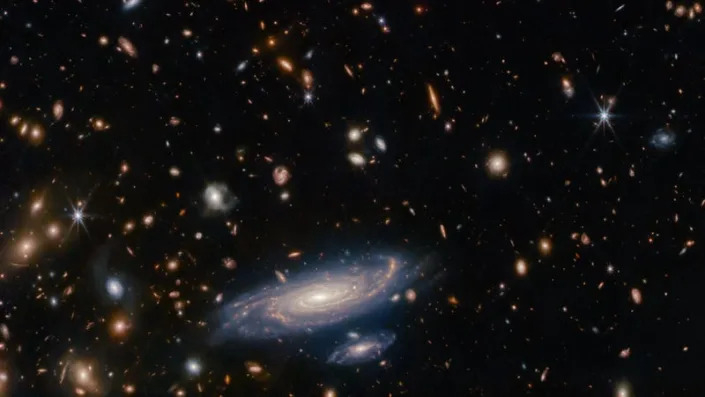Webb Telescope Captures Countless Galaxies in New Image
Isaac Schultz
Tue, January 31, 2023 at 2:50 PM MST·2 min read

The distant spiral galaxy LEDA 2046648.
The European Space Agency has released its image of the month for January, and it is (perhaps unsurprisingly) a stunning shot from the Webb Space Telescope.
At the bottom of the image is LEDA 2046648, a spiral galaxy over one billion light-years from Earth in the constellation Hercules. Behind LEDA is a field of more distant galaxies, ranging from spiral shapes to pinpricks of light in the distant universe.
Webb launched from French Guiana in December 2021; its scientific observations of the cosmos began in July. Webb has imaged distant galaxies, exoplanets, and even shed new light on worlds in our local solar system.
Though this image was only just released, it was taken during the commissioning process for one of Webb’s instruments, the Near-Infrared Imager and Slitless Spectrograph (NIRISS), according to an ESA release. While NIRISS was focused on a white dwarf—the core remnant of a star—Webb’s Near-Infrared Camera (NIRCam) turned its focus to LEDA 2046648 and its environs in the night sky.
One of Webb’s primary objectives in looking at the distant universe is to better understand how the first stars and galaxies formed. To that end, the telescope is looking at some of the most ancient light in the universe, primarily through its instruments NIRCam and MIRI.
The image does contains hundreds of light sources our eye can perceive, but the infrared data from which the image was formed certainly records many more galaxies.
Webb’s deep field imagery is what enables scientists to see some of the most ancient light in the universe, often capitalizing on gravitational lensing (the magnification of distant light due to the gravitational warping of spacetime) to see particularly ancient sources.
Though this shot of LEDA 2046648 is not a deep field, it evokes a similar feeling: awe, at the huge scale of the cosmos, and (if only briefly) the realization that our minds can only comprehend a fraction of it.
More: Zoom in on Webb Telescope’s Biggest Image Yet
Gizmodo
No comments:
Post a Comment